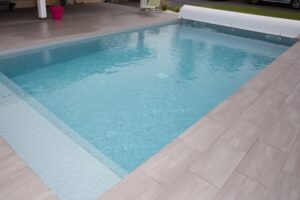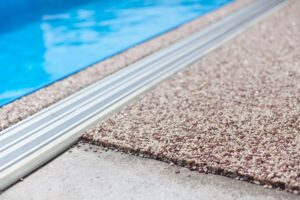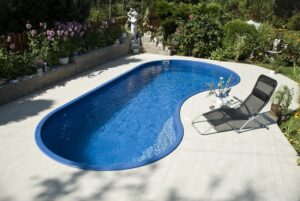When your pool’s surface begins to show its age—faded patches, rough spots, or even noticeable cracks—swimming quickly becomes less inviting. An outdated finish isn’t just unattractive; it reduces comfort, shortens your pool’s lifespan, and lowers your home’s overall value.
Selecting the right pool resurfacing materials restores both beauty and durability, making each swim enjoyable and preserving your investment. Quartz finishes offer long-lasting color and stain resistance, pebble finishes deliver unmatched durability and a natural look, while traditional plaster remains budget-friendly with a smoother feel.
Understanding the pros, cons, durability, and maintenance requirements of each resurfacing option helps you make an informed decision. By comparing quartz, pebble, and plaster, you’ll confidently choose a material that revitalizes your pool and enhances your outdoor living space.
Table of Contents
ToggleWhat to Consider When Choosing Pool Resurfacing Materials
Several factors help you choose the best resurfacing materials when planning to resurface your pool. Knowing what matters most makes your choice easier, so consider these essentials first.
Durability and Lifespan
Durability determines how well your pool surface handles daily use, harsh weather conditions, and chemicals. A durable material reduces wear and tear, meaning less frequent resurfacing and fewer costly repairs. Lifespan also impacts your investment—long-lasting materials keep your pool beautiful and usable longer, saving you money.
Appearance and Aesthetics
Your pool’s appearance shapes your backyard experience and affects your home’s overall appeal. Attractive pool finishes complement your landscape, inviting and relaxing your swimming area. Choosing materials that maintain color, resist stains, and enhance the water’s visual clarity ensures your pool stays beautiful for years.
Comfort and Surface Texture
Surface texture directly impacts swimmer comfort and safety. A smooth surface feels pleasant underfoot but can become slippery. Conversely, a textured surface offers slip resistance but may feel rough. Finding a balance between safety and comfort helps pool owners thoroughly enjoy their swimming pools without worries.
Maintenance Requirements
Easy-to-maintain pool resurfacing materials simplify pool care. Proper maintenance involves managing water chemistry and cleaning algae growth to avoid damaging the finish. Materials that resist chemical wear, stains, and algae growth significantly lower your maintenance efforts, keeping your pool enjoyable and hassle-free.
Quartz Pool Finish: Durable and Attractive

Quartz pool finishes are popular pool resurfacing materials that combine crushed quartz particles with white plaster and special polymers. This combination creates a beautiful, durable surface that is highly resistant to stains and chemical exposure. Quartz finishes are a favorite among many pool professionals for swimming pool resurfacing because they offer vibrant colors that can match almost any pool deck or landscape design.
Choose quartz finishes if you want a long-lasting pool surface that maintains aesthetic appeal even after years of regular use. Quartz is an excellent upgrade from traditional plaster and a cost-effective option compared to pebble surfaces.
Benefits | Drawbacks |
✅ Long-lasting and stain resistant | ❌ Higher upfront cost than plaster |
✅ Vibrant, customizable colors | |
✅ Low maintenance |
Pebble Pool Finish: Premium and Long-Lasting

Pebble pool finishes, often called “pebble tec,” use natural pebbles, glass beads, or mini pebble stones mixed with special cement blends. This premium pool resurfacing material creates a striking, natural appearance ideal for pool remodeling projects in high-end homes or commercial properties. Pebble surfaces provide exceptional durability, making them highly recommended for concrete pools and gunite pools, especially in areas like the Southern California area where pools face intense sun exposure.
While pebble finishes offer unmatched durability and a luxurious look, their textured surface is rougher than quartz or plaster. Consider pebble finishes if aesthetics and lifespan matter most and budget is less of a concern.
Advantages | Disadvantages |
✅ Exceptional durability and lifespan | ❌ Rougher texture, less comfortable |
✅ Luxurious, natural appearance | ❌ Typically the most expensive |
✅ Highly resistant to chemical wear |
Plaster Pool Finish: Affordable and Traditional

Plaster remains one of the most popular pool resurfacing materials in the pool industry. Made from white cement and marble sand, plaster gives your swimming pool a classic, clean look. Most pool owners choose plaster when budget is a key concern. It offers a smooth texture, gentle on swimmers’ feet, making it ideal for families or commercial pools seeking comfort and affordability.
However, plaster has drawbacks. It has the shortest lifespan compared to other pool resurfacing options and is prone to staining or discoloration, especially if you don’t maintain proper water chemistry. Proper upkeep and careful monitoring of pool chemicals help extend its lifespan.
Pros | Cons |
✅ Most budget-friendly option | ❌ Shortest lifespan |
✅ Smooth, comfortable texture | ❌ Prone to stains and discoloration |
Quartz vs. Pebble vs. Plaster: Direct Comparison
Choosing the right pool resurfacing materials involves clearly comparing costs, durability, appearance, and maintenance needs.
Material | Cost per Square Foot* |
Plaster | $5–$6 |
Quartz | $7–$10 |
Pebble | Around $10 |
*Cost comparisons are from Angi. Actual pricing varies based on your location, pool size, and condition of your existing pool surface.
Durability and Lifespan:
Pebble pool finish offers the longest lifespan, followed closely by quartz. Plaster typically lasts the shortest, requiring frequent resurfacing.
Appearance and Customization:
Pebble and quartz pool finishes provide customizable colors and textures. Plaster offers fewer design options.
Maintenance Considerations:
Plaster needs the most care to avoid staining. Quartz and pebble finishes are more stain-resistant and easier to maintain.
How to Decide Which Pool Resurfacing Materials Are Best for You
When selecting pool resurfacing materials, consider your budget and lifestyle first. Plaster is ideal if you’re watching costs or prefer a smooth surface. Quartz and pebble finishes fit better if you value durability and aesthetics. Think about your entire pool area—does your existing pool surface or pool deck resurfacing match your choice well?
Also, factor in long-term maintenance. Resurfacing swimming pools requires proper care to protect the pool shell and finish. Talk with most pool professionals before making your decision. They provide trustworthy advice based on experience, helping you match the perfect pool plaster or premium finishes to your needs. Professional consultation ensures your investment remains attractive and reliable for years, making your pool a welcoming spot to relax and enjoy.
Choose the Right Pool Resurfacing Materials for Lasting Results
Picking the best pool resurfacing materials ensures lasting beauty, comfort, and reliability. Plaster is budget-friendly with a smooth feel, while quartz offers durability and customizable colors. Pebble finishes, favored by most pool professionals, deliver unmatched longevity and a luxurious look. Your choice affects not just your pool’s appearance, but also your home’s overall value and maintenance requirements.
To make sure your decision brings lasting satisfaction, connect with experts like Professional Aquatic Services. With trusted guidance and professional installation, you get the ideal resurfacing solution matched perfectly to your needs. Choosing the right materials now means fewer worries later, giving you peace of mind and more time to enjoy your pool.
FAQs: Pool Resurfacing Materials
Pebble finishes are the most durable pool resurfacing materials available. They offer excellent resistance to wear, chemical exposure, and weather, making them ideal for long-term performance.
Quartz finishes typically last 10 to 15 years. Pebble finishes can last 15 to 25 years or longer with proper care. Plaster, the least durable, usually lasts about 7 to 10 years.
Plaster pool finishes offer the smoothest and most comfortable texture for swimmers. Quartz provides moderate comfort, while pebble finishes are rougher, although they offer better slip resistance.
Yes, you can resurface your existing pool surface later. Most pool professionals recommend resurfacing swimming pools every 10-15 years, depending on wear, maintenance, and the original finish quality.
Quality pool resurfacing materials enhance your home's value by improving the pool's appearance and functionality. Pebble and quartz finishes generally boost value more significantly than traditional plaster due to their durability and appealing look.

